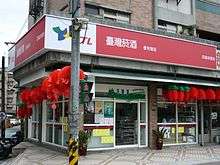Alcohol monopoly

An alcohol monopoly is a government monopoly on manufacturing and/or retailing of some or all alcoholic beverages, such as beer, wine and spirits. It can be used as an alternative for total prohibition. They exist in all Nordic countries except mainland Denmark (only on the Faroe Islands), and in all provinces and territories in Canada except Alberta (which privatized its monopoly in 1993). In the United States, there are some alcoholic beverage control states, where alcohol sales are controlled by either private retailers or like in Pennsylvania, a government operation. An alcohol monopoly also formerly existed in the Republic of China (Taiwan) between 1947 and 2002, when the Taiwan market was opened to overseas brands as part of its admission to the WTO in 2002.
Examples of alcohol monopolies are namely Systembolaget in Sweden, Alko in Finland, Vínbúð in Iceland, Rúsdrekkasøla Landsins in the Faroe Islands, Vinmonopolet in Norway, SAQ in Quebec, LCBO in Ontario, TASMAC in Tamil Nadu, India, Kerala State Beverages Corporation in Kerala, India.
History
The alcohol monopoly was created in the Swedish town of Falun in 1850, to prevent overconsumption and reduce the profit motive for sales of alcohol. It later went all over the country in 1905 when the Swedish parliament ordered all sales of vodka to be done via local alcohol monopolies.[1] In 1895, Russia established a state monopoly on alcohol, which became a major source of revenue for the Russian government.
Following the prohibition of alcohol in Norway in 1919, the wine-producing nations demanded a reflexive policy regarding the goods exported from Norway, and Vinmonopolet was established in 1922, as a response to a deal with France, which allowed Norwegians to buy as much table wine of any kind as they wanted.[2] When prohibition was lifted on fortified wine in 1923 and spirits in 1926, Vinmonopolet assumed sales of these goods as well.[2]
The Taiwan Tobacco and Liquor Corporation is the modern-day descendant of a government agency originally established during Japanese rule in 1901 which was responsible for all liquor and tobacco products in Taiwan as well as opium, salt, and camphor. In 1922, the agency began selling Takasago Beer through the Takasago Malted Beer Company, which was subsequently renamed as Taiwan Beer in 1946. After the end of World War II in 1945, the incoming Kuomintang preserved the monopoly system for alcohol and tobacco, and assigned the production of beer to the Taiwan Provincial Monopoly Bureau, which was renamed as Taiwan Tobacco and Wine Monopoly Bureau the following year. The Bureau exercised a monopoly on all alcohol and tobacco products sold in Taiwan until its admission into the WTO in 2002, after which it was succeeded by the state-owned Taiwan Tobacco and Liquor Corporation which competes with many overseas brands today.
See also
References
- ↑ Systembolaget.se About Systembolaget
- 1 2 Vinmonopolet.no Vinmonopolet History
